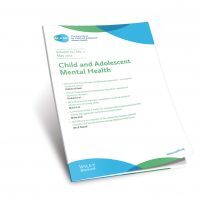Psychotherapies
-

JCPP Editorial: Volume 64, Issue 08, August 2023
Editorial “Developmental considerations in addressing the earlier age of severe eating disorder onset” by Rebecca C. Kamody and Michael H. Bloch
Read more -

Report from a randomized control trial: improved alignment between circadian biology and sleep–wake behavior as a mechanism of depression symptom improvement in evening-type adolescents with depressive symptoms
Open Access paper from the JCPP – ‘These results provide novel evidence for improved alignment between circadian biology and sleep–wake behavior as a specific mechanism of depression improvement, provide key clues into the complex relationship between sleep and depression, and have significant clinical implications for adolescents with depression.’ Lauren D. Asarnow (pic) et al.
Read more -

Therapeutic alliance in the treatment of adolescent substance misuse: a systematic review
Open Access paper from the CAMH journal – ‘Therapeutic alliance has been found to play an influential role in predicting outcomes for adults and adolescents in psychotherapy. However, thus far, the information concerning the impact of therapeutic alliance on outcomes for adolescents in treatment for substance misuse has not yet been critically synthesised’. Iniyah Sulaman et al.
Read more -

Review: Adverse event monitoring and reporting in studies of pediatric psychosocial interventions: a systematic review
Open Access paper from the CAMH journal – ‘In this systematic review, we identified how adverse events are defined, measured, and reported in studies of psychosocial interventions for children with mental disorders’. Kalee Lodewyk et al.
Read more -

Do single-case experimental designs lead to randomised controlled trials of cognitive behavioural therapy interventions for adolescent anxiety and related disorders recommended in the National Institute of Clinical Excellence guidelines? A systematic review
Open Access paper from JCPP Advances – ‘The primary purpose of this review was to investigate whether Single-case experimental designs (SCEDs) are currently followed by randomised controlled trials (RCTs) of cognitive behavioural therapy (CBT) intervention for adolescent anxiety disorders named in the NICE guidelines’. Tom Cawthorne et al.
Read more -

Professor Michael Kaess
Michael Kaess is Professor of Child and Adolescent Psychiatry and Psychotherapy at the University of Bern as well as the Director of the University Hospital of Child and Adolescent Psychiatry and Psychotherapy Bern in Switzerland. Professor Kaess is a Joint Editor of CAMH.
Read more -

Dr. Nicole Papadopoulos
Dr. Nicole Papadopoulos is a Senior research fellow and Clinical Psychologist in the School of Educational Psychology and Counselling, Monash University. She is an Associate Editor of CAMH.
Read more -

Development, reach, acceptability and associated clinical changes of a group intervention to improve caregiver-adolescent relationships in the context of adolescent depression
Open Access paper from JCPP Advances – ‘Following a literature search to identify established caregiver interventions, we developed a new group intervention for caregivers through an iterative process including six rounds of the group with caregivers of adolescents age 13–18 in the context of an integrated care pathway for adolescent depression.’ Madison Aitken (pic) et al.
Read more -

Enhanced late positive potential to conditioned threat cue during delayed extinction in anxious youth
Open Access paper from the JCPP – ‘This study compared threat learning among anxious and non-anxious youth using self-reports, peripheral psychophysiology measures, and event-related potentials’. Zohar Klein (pic) et al.
Read more -

Research Review: A systematic review and meta-analysis of nonpharmacological interventions for children and adolescents with selective mutism
Open Access paper from JCPP Advances – ‘Selective mutism (SM) is an anxiety disorder that often starts in early years with serious and lasting consequences. This systematic review identifies outcome measures used and outcomes achieved for nonpharmacological interventions for children and adolescents with SM’. Gino Hipolito (pic) et al.
Read more